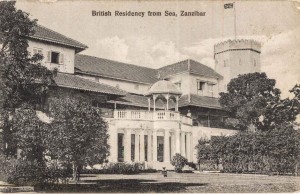by Donovan McGrath
Why Silence is golden for LGBT people in Zanzibar
by columnist Bryan Weiner.
On the north side of Stone Town the big all-night disco at Bwawani Hotel is getting started with their Tuesday gay night. On the other side of town, local women gather at a small barber shop to get their hair and henna done by the gay stylists. According to some accounts, same-sex relationships in this predominantly Muslim society are actually quite common, particularly as the male/female relations are so tightly controlled by culture and religion. I have been a gay mzungu (white person) living in Zanzibar for six months and have attempted to find the sort of gay community that exists here. It has been difficult. The gay community is hidden and secretive, but it is thriving in its own manner.
Tanzania is, of course, one of the 76 countries that penalize homosexuality. The penal code gives a minimum 30 years and a maximum life in prison for homosexuality, one of the harshest in the world. But no one has been convicted for homosexuality and the press only gives offhand mention to the topic. Silence on the issue isn’t a coincidence, but has been very strategically planned. Both the anti-gay voices and the LGBT voices are being silenced as Tanzania simply doesn’t want to address the issue, it is tied to many other issues at play in society. Historically, colonialists and missionaries brought the strict anti-homosexuality laws that are currently in place in many African countries, criminalizing many authentic indigenous homosexual practices. Now in 2014, these laws are brought up as indigenous and homosexuality is decried as a practice from the West. (RGOD2 online 29 August 2014)
21m children in rubella vaccination campaign
The symptoms of rubella can seem almost benign: mild, flu-like discomfort and a rash. But it can cause children to be born deaf and blind if their mothers catch the disease during pregnancy. And if the Ebola outbreak has taught the world anything it is perhaps that ignoring basic healthcare … can have devastating consequences. That is why a campaign to vaccinate 21 million children against measles and rubella in Tanzania is so important. (The Guardian – online 27 October 2014)
Campaigning for a child marriage-free Tanzania
A drive to end child marriage is underway in Tanzania. At the age of 16, Mahija Mwita was forced into marriage to a man 12 years older than her, so that her parents could get a bride price to help them solve the family’s problems. Mwita’s story mirrors the plight of hundreds of girls who are forced into early adulthood. The “Child Marriage-Free Zone” campaign was initiated by the Ministry of Community Development. Speaking in Dar at the launch of the campaign the international children’s rights advocate Graca Machel said that Tanzania’s ongoing constitutional review was an opportunity to change laws that facilitate gender-based violence. Wiltrudius Lwabutaza, a human rights lawyer, said the Law of Marriage Act of 1971, which sets the minimum age of marriage at 15 for girls, contradicts the Sexual Offences Act of 1998 which defines rape as non-consensual sex with a girl who is under 18 years.
(DW – online 1 September 2014)
Police officers fired for a kiss

When is it OK to kiss a colleague? Two Tanzanian police officers, whose kiss was widely shared on social media, have both have lost their jobs. The image was uploaded to the internet by a third officer, and drawn to the attention of the Kagera police authorities. News of the punishment has surprised many on social media. Masoud George, a lawyer at the Tanzania Legal and Human Rights Centre, says that severe as the punishment seems, the decision is unlikely to be illegal. (BBC News Trending – online 14 October 2014)
Google gives a glimpse of Jane Goodall’s chimpanzees
Chimpanzees and their remote forest home in Tanzania have joined camels in the Abu Dhabi desert on the list of things you can see on Google Streetview. A camera team spent nine days mapping Gombe national park, where Jane Goodall made her ground-breaking discovery over 50 years ago of chimps not just using but making tools. The Google images show chimps riding on their mother’s back and the spectacular view from ‘the peak’ – reportedly Goodall’s favourite spot in the park, which sits next to Lake Tanganyika.
(Guardian online 23 October)
Old postcards tell history of East Africa
One of the fascinating postcards (Joel Bertrand oldeastafricapostcards.com)
A website set up by Joel Bertrand entitled oldeastafricapostcards.com, uses postcards from a century ago to reveal the history of the region’s places and people. The visual record shows the fast changing face of East Africa, but one place that seems to have registered little change is Zanzibar. Many of the Zanzibar postcards could as well have been taken from today’s scenes. When Bertrand set out to collect the postcards several years ago, he searched all over the world. He got all of them from Europe, and did not find a single one in Africa. However, this is not surprising since they were created and sent “home” by Europeans. (East African 20-26 September)
Putin’s African hunter
Giles Whittell tells the story of Sergey Yastrzhembsky. Like many senior Russian personnel, Sergey wanted to give up his work with President Putin and escape from Russia – which can be difficult and even dangerous. He tried several times to get Putin’s permission to leave and eventually the President agreed. He had prepared himself and learnt to become an African hunter; his first hunt was in Tanzania’s Selous Game Reserve in 1997. He is also a top photographer, making films about Africa’s endangered tribes including the Maasai. He now stays strictly out of politics. (The Times 30 October)
Raid at Majira newsroom
Reporters of Majira newspapers are scared of doing investigative stories after unknown people invaded its newsroom and made away with computers and documents with crucial and sensitive editorial information. Sources within the newspaper connect the incident to its publication of an investigation into drug peddling and the captivity of Tanzanian youths in private homes in Pakistan. (Media Watch July-August)
Happy anniversary to The Citizen
Editor Joachim Buwembo recalls with pride the launching of The Citizen newspaper in Tanzania exactly 10 years ago. President Mkapa wrote a welcome message that was published on page one of the maiden issue. The following year, Mkapa handed over to President Kikwete. And next year, President Kikwete will hand over to his successor. So in just 11 years of operation, The Citizen will have covered three sitting presidents. (East African 6-12 September)
Chinese Company to Build New Satellite City
China Railway /Jianchang Engineering Company Ltd. will construct a $1 billion satellite city and a $500 million financial district in Tanzania. Under the accord signed with Tanzania’s National Housing Corporation, Salama Creek Satellite City will be built in Uvumba, a district on the outskirts of Dar. The new financial services district will be in the suburb of Upanga. (Bloomberg Businessweek online 24 October)
A Fish in the Sand
The film Samaki Mchangani [A Fish in the Sand] is scheduled to be screened at Mlimani City. Samaki Mchangani is the second short film by Kijiweni Productions, a Tanzanian-owned film company run by director and young filmmaker Amil Shivji, a Tanzanian of Indian ancestry and son of Issa Shivji, a constitutional law lecturer at the University of Dar es Salaam. (East African 13-19 September)
The Scottish Referendum and Tanzania by Columnist Elsie Eyakuze
The referendum on Scottish independence has had a ripple effect, raising the question of self-determination in other societies around the world that yearn for self-determination. Here in East Africa, there is something rather comfortingly familiar about the Scottish independence quest. In fact, just raising the topic naturally leads to a discussion about the beautiful islands of Zanzibar that may or may not be voluntary parts of the Union of Tanzania.
Tanzania came very close to managing the process of making a new constitution. Early on, it was bogged down by fundamental concerns about how many governments Tanzania should have if it was going to continue being a Union. Over the many decades of our coming together, rather than maturing into a complacent satisfaction with each other the Mainland and Zanzibar have developed a chronic condition of perpetual debate about what is fair of not in our agreement. It is taboo to even talk about the Zanzibari independence movement if you happen to be a Mainlander.
Tanzania has always prided itself – and with good reason – for flying the flag of the pan-African dream. The interesting contradiction is that we are also reluctant to join politically with any of our neighbours. One of the most compelling factors of the Independence movement in the sixties was its ability to rally disparate peoples under the banner of freedom. And isn’t it interesting that this very same notion of freedom can be used to tear apart existing territories to give rise to new ones based on identities that more often than not pre-date our countries? Generation Independence may have rewritten our histories to suit its nation-building agenda, but somehow tribalism refuses to die. Maybe that is because our tribes are who we really are. The Scots seem to be suggesting so… (East African 20-26 September)

